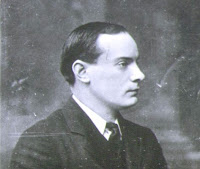 The Dagda's Harp
The Dagda's HarpIt is said that there were two quite different kinds of people in Ireland: one set of people with long dark hair and dark eyes, called Fomorians -- they carried long slender spears made of golden bronze when they fought -- and another race of people who were golden-haired and blue-eyed, and who carried short, blunt, heavy spears of dull metal.
The golden-haired people had a great chieftain who was also a kind of high priest, who was called the Dagda. And this Dagda had a wonderful magic harp. The harp was beautiful to look upon, mighty in size, made of rare wood, and ornamented with gold and jewels; and it had wonderful music in its strings, which only the Dagda could call out. When the men were going out to battle, the Dagda would set up his magic harp and sweep his hand across the strings, and a war song would ring out which would make every warrior buckle on his armour, brace his knees, and shout, ``Forth to the fight!'' Then, when the men came back from the battle, weary and wounded, the Dagda would take his harp and strike a few chords, and as the magic music stole out upon the air, every man forgot his weariness and the smart of his wounds, and thought of the honour he had won, and of the comrade who had died beside him, and of the safety of his wife and children. Then the song would swell out louder, and every warrior would remember only the glory he had helped win for the king; and each man would rise at the great tables his cup in his hand, and shout ``Long live the King!''
There came a time when the Fomorians and the golden-haired men were at war; and in the midst of a great battle, while the Dagda's hall was not so well guarded as usual, some of the chieftains of the Fomorians stole the great harp from the wall, where it hung, and fled away with it. Their wives and children and some few of their soldiers went with them, and they fled fast and far through the night, until they were a long way from the battlefield. Then they thought they were safe, and they turned aside into a vacant castle, by the road, and sat down to a banquet, hanging the stolen harp on the wall.
The Dagda, with two or three of his warriors, had followed hard on their track. And while they were in the midst of their banqueting, the door was suddenly burst open, and the Dagda stood there, with his men. Some of the Fomorians sprang to their feet, but before any of them could grasp a weapon, the Dagda called out to his harp on the wall, ``Come to me, O my harp!''
The great harp recognized its master's voice, and leaped from the wall. Whirling through the hall, sweeping aside and killing the men who got in its way, it sprang to its master's hand. And the Dagda took his harp and swept his hand across the strings in three great, solemn chords. The harp answered with the magic Music of Tears. As the wailing harmony smote upon the air, the women of the Fomorians bowed their heads and wept bitterly, the strong men turned their faces aside, and the little children sobbed.
Again the Dagda touched the strings, and this time the magic Music of Mirth leaped from the harp. And when they heard that Music of Mirth, the young warriors of the Fomorians began to laugh; they laughed till the cups fell from their grasp, and the spears dropped from their hands, while the wine flowed from the broken bowls; they laughed until their limbs were helpless with excess of glee.
Once more the Dagda touched his harp, but very, very softly. And now a music stole forth as soft as dreams, and as sweet as joy: it was the magic Music of Sleep.
When they heard that, gently, gently, the Fomorian women bowed their heads in slumber; the little children crept to their mothers' laps; the old men nodded; and the young warriors drooped in their seats and closed their eyes: one after another all the Fomorians sank into sleep.
When they were all deep in slumber, the Dagda took his magic harp, and he and his golden-haired warriors stole softly away, and came in safety to their own homes again.
















